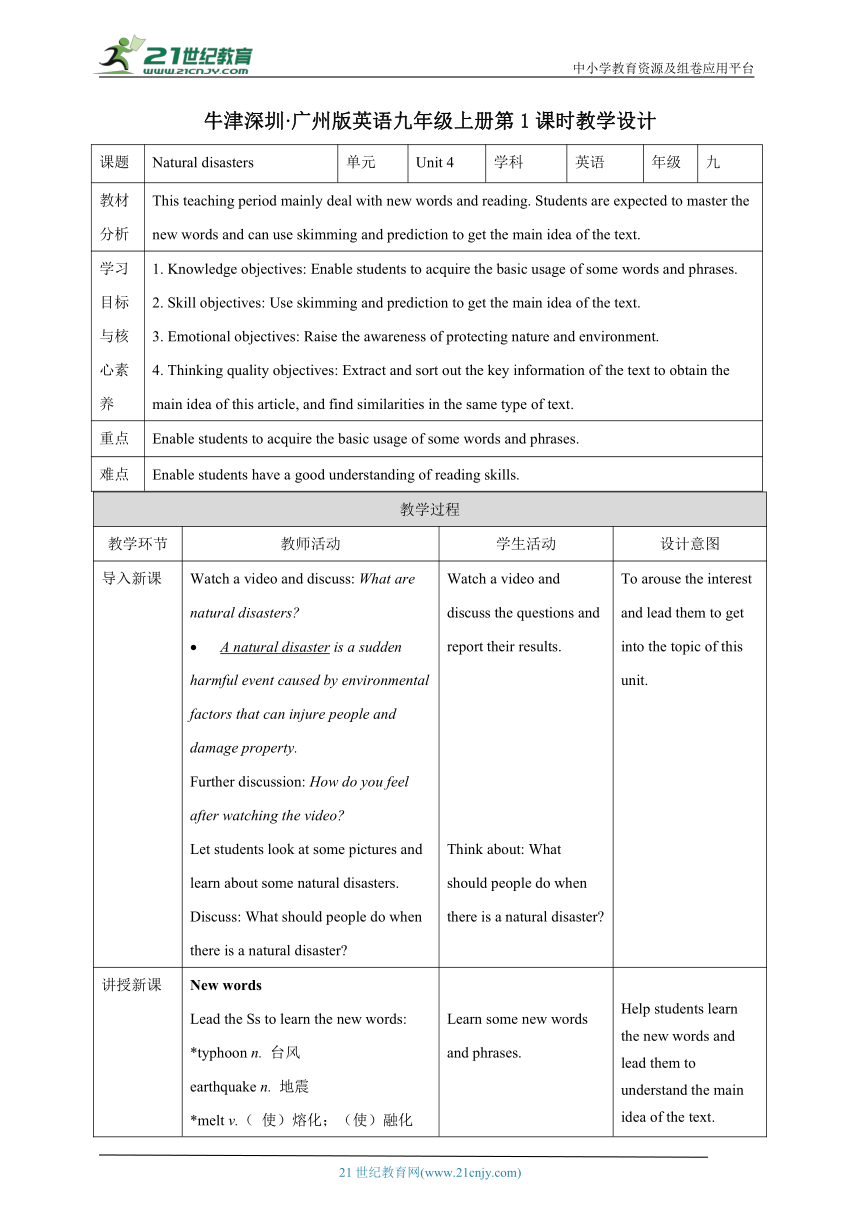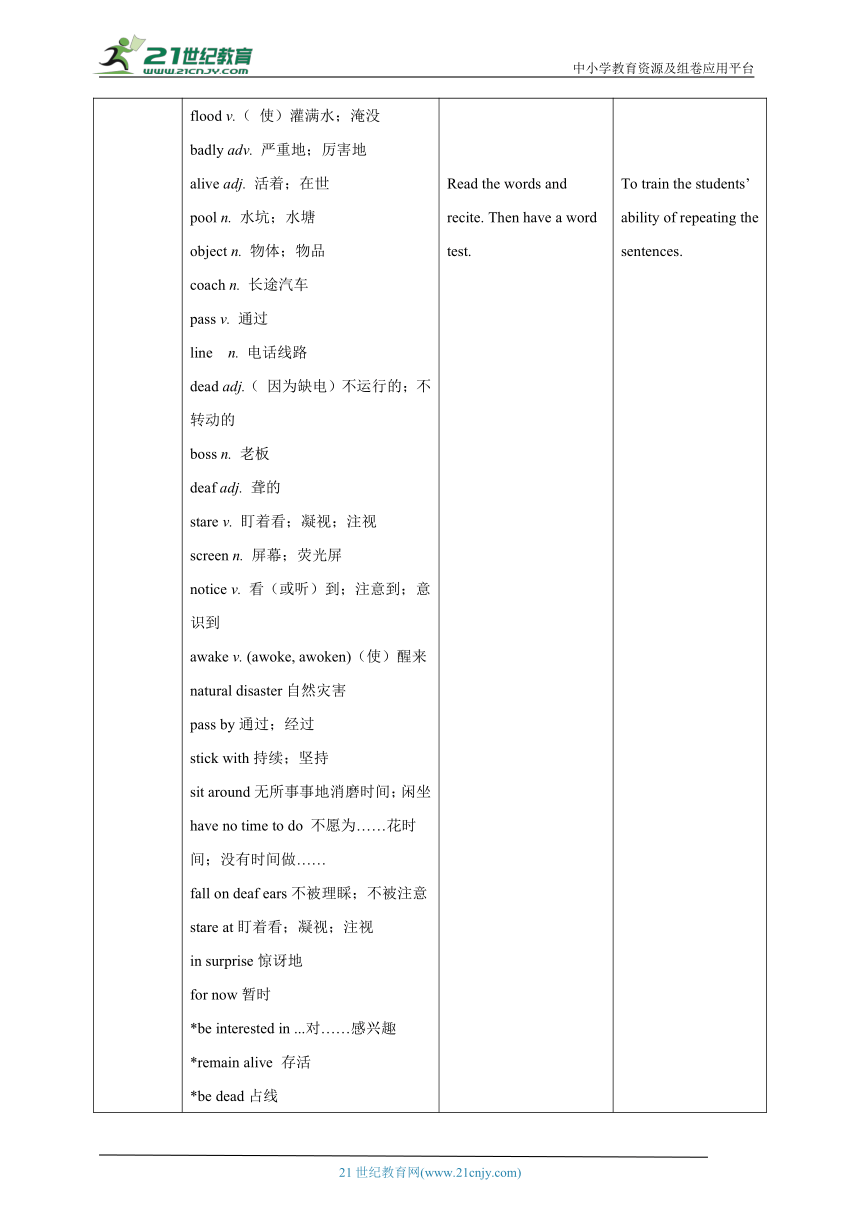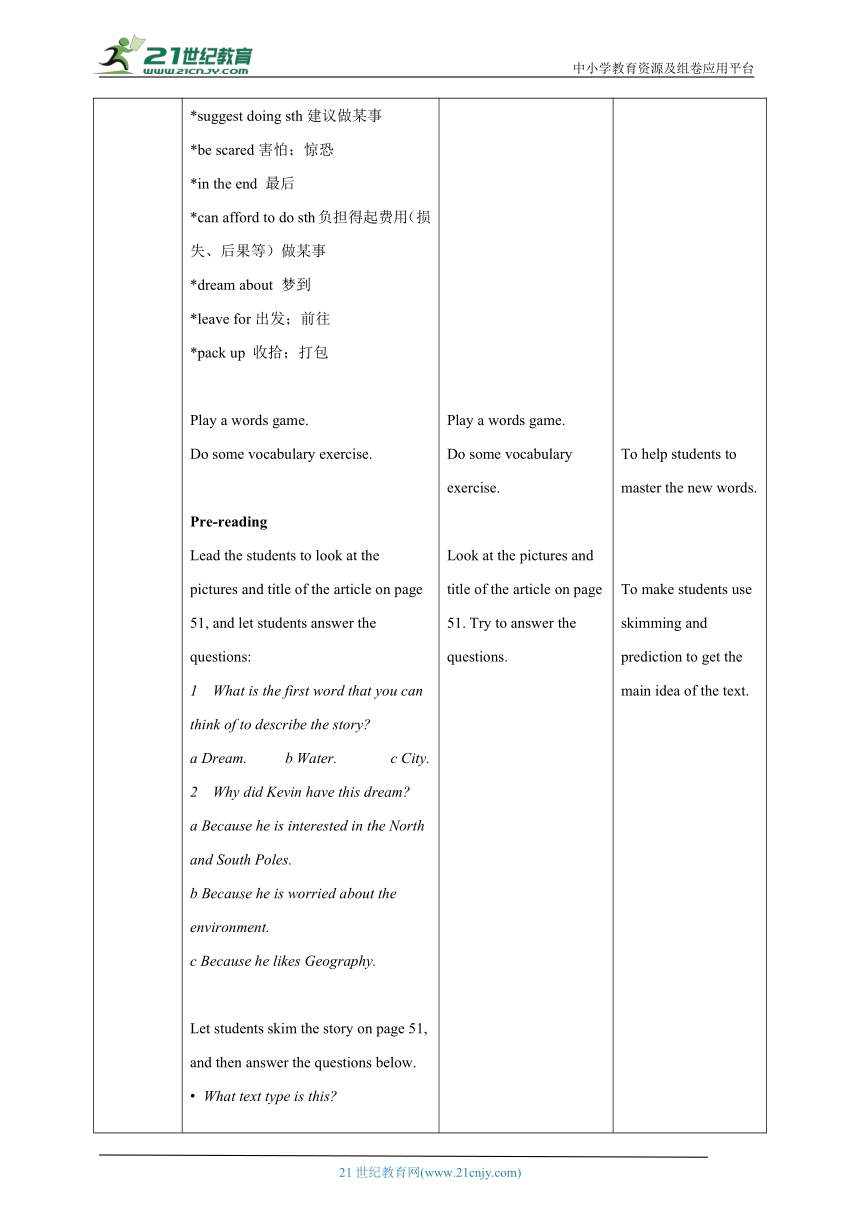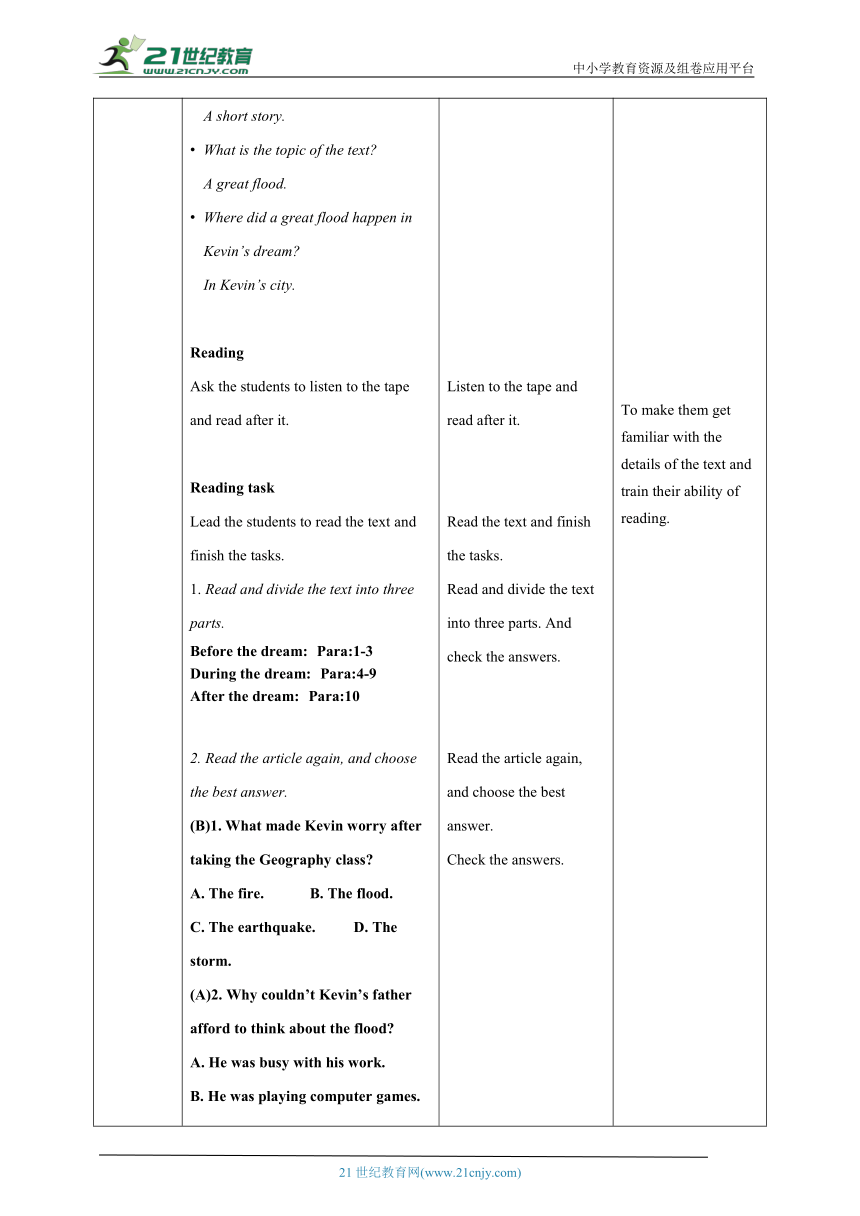【核心素养目标】Unit 4 Natural disasters 第1课时ReadingI教案
文档属性
| 名称 | 【核心素养目标】Unit 4 Natural disasters 第1课时ReadingI教案 |  | |
| 格式 | doc | ||
| 文件大小 | 1.2MB | ||
| 资源类型 | 试卷 | ||
| 版本资源 | 牛津深圳版 | ||
| 科目 | 英语 | ||
| 更新时间 | 2023-01-12 09:42:39 | ||
图片预览




文档简介
中小学教育资源及组卷应用平台
课题 Natural disasters 单元 Unit 4 学科 英语 年级 九
教材分析 This teaching period mainly deal with new words and reading. Students are expected to master the new words and can use skimming and prediction to get the main idea of the text.
学习目标与核心素养 1. Knowledge objectives: Enable students to acquire the basic usage of some words and phrases.2. Skill objectives: Use skimming and prediction to get the main idea of the text.3. Emotional objectives: Raise the awareness of protecting nature and environment.4. Thinking quality objectives: Extract and sort out the key information of the text to obtain the main idea of this article, and find similarities in the same type of text.
重点 Enable students to acquire the basic usage of some words and phrases.
难点 Enable students have a good understanding of reading skills.
牛津深圳·广州版英语九年级上册第1课时教学设计
教学过程
教学环节 教师活动 学生活动 设计意图
导入新课 Watch a video and discuss: What are natural disasters A natural disaster is a sudden harmful event caused by environmental factors that can injure people and damage property. Further discussion: How do you feel after watching the video Let students look at some pictures and learn about some natural disasters.Discuss: What should people do when there is a natural disaster Watch a video and discuss the questions and report their results.Think about: What should people do when there is a natural disaster To arouse the interest and lead them to get into the topic of this unit.
讲授新课 New wordsLead the Ss to learn the new words: *typhoon n. 台风 earthquake n. 地震 *melt v.( 使)熔化;(使)融化flood v.( 使)灌满水;淹没 badly adv. 严重地;厉害地 alive adj. 活着;在世 pool n. 水坑;水塘 object n. 物体;物品 coach n. 长途汽车 pass v. 通过 line n. 电话线路dead adj.( 因为缺电)不运行的;不转动的boss n. 老板 deaf adj. 聋的 stare v. 盯着看;凝视;注视 screen n. 屏幕;荧光屏 notice v. 看(或听)到;注意到;意识到 awake v. (awoke, awoken)(使)醒来 natural disaster自然灾害 pass by通过;经过 stick with持续;坚持 sit around无所事事地消磨时间;闲坐 have no time to do 不愿为……花时间;没有时间做……fall on deaf ears不被理睬;不被注意 stare at盯着看;凝视;注视 in surprise惊讶地 for now暂时 *be interested in ...对……感兴趣*remain alive 存活*be dead占线*suggest doing sth建议做某事*be scared害怕;惊恐*in the end 最后*can afford to do sth负担得起费用(损失、后果等)做某事*dream about 梦到*leave for出发;前往*pack up 收拾;打包Play a words game.Do some vocabulary exercise.Pre-readingLead the students to look at the pictures and title of the article on page 51, and let students answer the questions:1 What is the first word that you can think of to describe the story a Dream. b Water. c City.2 Why did Kevin have this dream a Because he is interested in the North and South Poles.b Because he is worried about the environment.c Because he likes Geography.Let students skim the story on page 51, and then answer the questions below.What text type is this A short story.What is the topic of the text A great flood. Where did a great flood happen in Kevin’s dream In Kevin’s city.ReadingAsk the students to listen to the tape and read after it.Reading taskLead the students to read the text and finish the tasks.1. Read and divide the text into three parts.Before the dream: Para:1-3During the dream: Para:4-9After the dream: Para:102. Read the article again, and choose the best answer.(B)1. What made Kevin worry after taking the Geography class A. The fire. B. The flood. C. The earthquake. D. The storm.(A)2. Why couldn’t Kevin’s father afford to think about the flood A. He was busy with his work. B. He was playing computer games.C. He was going on a business trip. D. He was having a rest.(C)3. What can we learn from the passage A. Kevin’s computer didn’t work.B. There was a great flood in Kevin's city.C. It was too late for people to notice the flood.D. Everyone left immediately to stay away from the flood. (C)4. What is the purpose of the passage A. To show the bad effects of a great flood.B. To ask people to spend more time on work.C. To ask people to pay attention to the disasters.D. To tell people an experience about a great flood.3. Read the story and complete the scenes on page 53.Post readingIntroduce a strategy: recognizing the moral of a story.After reading the story, can you choose which one the moral of the story is People should care more about the environment.Language pointsLead the Ss to learn the language points.1. think of2. everywhere3. tried to & dead4. 定语从句5. in surpriseFinish the exercise and check the answers.Summarize the key words and phrases.Key words: earthquake, flood, badly, alive, pool, object, coach, pass, line, dead, boss, deaf, stare, screen, notice, awakeKey phrases: natural disaster, pass by, stick with, sit around, have no time to do, fall on deaf ears, stare at, in surprise, for now, be interested in, remain alive, be dead, suggest doing sth., be scared, in the end, can afford to do sth., dream about, leave for, pack up Learn some new words and phrases.Read the words and recite. Then have a word test. Play a words game.Do some vocabulary exercise.Look at the pictures and title of the article on page 51. Try to answer the questions. Listen to the tape and read after it.Read the text and finish the tasks.Read and divide the text into three parts. And check the answers.Read the article again, and choose the best answer.Check the answers.Read the story and complete the scenes on page 53 and check the answers.Learn about how to recognize the moral of a story. Read the story again, and choose the moral of the story.Learn some language points.Make sentences with these important points in the text and take notes of the explanations of the important points.Finish the exercise and check the answers.Review the new words and phrases. Help students learn the new words and lead them to understand the main idea of the text.To train the students’ ability of repeating the sentences.To help students to master the new words.To make students use skimming and prediction to get the main idea of the text.To make them get familiar with the details of the text and train their ability of reading.To master the usage of the key points of the text.To conclude the usage of the key points of the text.To conclude and review what students have learnt.
课堂小结 本课通过阅读课文,让学生能运用略读、预测策略,能根据上下文语境猜测词义,了解主阅读篇章的主旨大意,学习核心单词和短语,并能正确理解文章内容,用正确的语音语调朗读短文,并初步复述。培养学生的合作能力。
板书 Key words: earthquake, flood, badly, alive, pool, object, coach, pass, line, dead, boss, deaf, stare, screen, notice, awakeKey phrases: natural disaster, pass by, stick with, sit around, have no time to do, fall on deaf ears, stare at, in surprise, for now, be interested in, remain alive, be dead, suggest doing sth., be scared, in the end, can afford to do sth., dream about, leave for, pack up
21世纪教育网 www.21cnjy.com 精品试卷·第 2 页 (共 2 页)
HYPERLINK "http://www.21cnjy.com/" 21世纪教育网(www.21cnjy.com)
课题 Natural disasters 单元 Unit 4 学科 英语 年级 九
教材分析 This teaching period mainly deal with new words and reading. Students are expected to master the new words and can use skimming and prediction to get the main idea of the text.
学习目标与核心素养 1. Knowledge objectives: Enable students to acquire the basic usage of some words and phrases.2. Skill objectives: Use skimming and prediction to get the main idea of the text.3. Emotional objectives: Raise the awareness of protecting nature and environment.4. Thinking quality objectives: Extract and sort out the key information of the text to obtain the main idea of this article, and find similarities in the same type of text.
重点 Enable students to acquire the basic usage of some words and phrases.
难点 Enable students have a good understanding of reading skills.
牛津深圳·广州版英语九年级上册第1课时教学设计
教学过程
教学环节 教师活动 学生活动 设计意图
导入新课 Watch a video and discuss: What are natural disasters A natural disaster is a sudden harmful event caused by environmental factors that can injure people and damage property. Further discussion: How do you feel after watching the video Let students look at some pictures and learn about some natural disasters.Discuss: What should people do when there is a natural disaster Watch a video and discuss the questions and report their results.Think about: What should people do when there is a natural disaster To arouse the interest and lead them to get into the topic of this unit.
讲授新课 New wordsLead the Ss to learn the new words: *typhoon n. 台风 earthquake n. 地震 *melt v.( 使)熔化;(使)融化flood v.( 使)灌满水;淹没 badly adv. 严重地;厉害地 alive adj. 活着;在世 pool n. 水坑;水塘 object n. 物体;物品 coach n. 长途汽车 pass v. 通过 line n. 电话线路dead adj.( 因为缺电)不运行的;不转动的boss n. 老板 deaf adj. 聋的 stare v. 盯着看;凝视;注视 screen n. 屏幕;荧光屏 notice v. 看(或听)到;注意到;意识到 awake v. (awoke, awoken)(使)醒来 natural disaster自然灾害 pass by通过;经过 stick with持续;坚持 sit around无所事事地消磨时间;闲坐 have no time to do 不愿为……花时间;没有时间做……fall on deaf ears不被理睬;不被注意 stare at盯着看;凝视;注视 in surprise惊讶地 for now暂时 *be interested in ...对……感兴趣*remain alive 存活*be dead占线*suggest doing sth建议做某事*be scared害怕;惊恐*in the end 最后*can afford to do sth负担得起费用(损失、后果等)做某事*dream about 梦到*leave for出发;前往*pack up 收拾;打包Play a words game.Do some vocabulary exercise.Pre-readingLead the students to look at the pictures and title of the article on page 51, and let students answer the questions:1 What is the first word that you can think of to describe the story a Dream. b Water. c City.2 Why did Kevin have this dream a Because he is interested in the North and South Poles.b Because he is worried about the environment.c Because he likes Geography.Let students skim the story on page 51, and then answer the questions below.What text type is this A short story.What is the topic of the text A great flood. Where did a great flood happen in Kevin’s dream In Kevin’s city.ReadingAsk the students to listen to the tape and read after it.Reading taskLead the students to read the text and finish the tasks.1. Read and divide the text into three parts.Before the dream: Para:1-3During the dream: Para:4-9After the dream: Para:102. Read the article again, and choose the best answer.(B)1. What made Kevin worry after taking the Geography class A. The fire. B. The flood. C. The earthquake. D. The storm.(A)2. Why couldn’t Kevin’s father afford to think about the flood A. He was busy with his work. B. He was playing computer games.C. He was going on a business trip. D. He was having a rest.(C)3. What can we learn from the passage A. Kevin’s computer didn’t work.B. There was a great flood in Kevin's city.C. It was too late for people to notice the flood.D. Everyone left immediately to stay away from the flood. (C)4. What is the purpose of the passage A. To show the bad effects of a great flood.B. To ask people to spend more time on work.C. To ask people to pay attention to the disasters.D. To tell people an experience about a great flood.3. Read the story and complete the scenes on page 53.Post readingIntroduce a strategy: recognizing the moral of a story.After reading the story, can you choose which one the moral of the story is People should care more about the environment.Language pointsLead the Ss to learn the language points.1. think of2. everywhere3. tried to & dead4. 定语从句5. in surpriseFinish the exercise and check the answers.Summarize the key words and phrases.Key words: earthquake, flood, badly, alive, pool, object, coach, pass, line, dead, boss, deaf, stare, screen, notice, awakeKey phrases: natural disaster, pass by, stick with, sit around, have no time to do, fall on deaf ears, stare at, in surprise, for now, be interested in, remain alive, be dead, suggest doing sth., be scared, in the end, can afford to do sth., dream about, leave for, pack up Learn some new words and phrases.Read the words and recite. Then have a word test. Play a words game.Do some vocabulary exercise.Look at the pictures and title of the article on page 51. Try to answer the questions. Listen to the tape and read after it.Read the text and finish the tasks.Read and divide the text into three parts. And check the answers.Read the article again, and choose the best answer.Check the answers.Read the story and complete the scenes on page 53 and check the answers.Learn about how to recognize the moral of a story. Read the story again, and choose the moral of the story.Learn some language points.Make sentences with these important points in the text and take notes of the explanations of the important points.Finish the exercise and check the answers.Review the new words and phrases. Help students learn the new words and lead them to understand the main idea of the text.To train the students’ ability of repeating the sentences.To help students to master the new words.To make students use skimming and prediction to get the main idea of the text.To make them get familiar with the details of the text and train their ability of reading.To master the usage of the key points of the text.To conclude the usage of the key points of the text.To conclude and review what students have learnt.
课堂小结 本课通过阅读课文,让学生能运用略读、预测策略,能根据上下文语境猜测词义,了解主阅读篇章的主旨大意,学习核心单词和短语,并能正确理解文章内容,用正确的语音语调朗读短文,并初步复述。培养学生的合作能力。
板书 Key words: earthquake, flood, badly, alive, pool, object, coach, pass, line, dead, boss, deaf, stare, screen, notice, awakeKey phrases: natural disaster, pass by, stick with, sit around, have no time to do, fall on deaf ears, stare at, in surprise, for now, be interested in, remain alive, be dead, suggest doing sth., be scared, in the end, can afford to do sth., dream about, leave for, pack up
21世纪教育网 www.21cnjy.com 精品试卷·第 2 页 (共 2 页)
HYPERLINK "http://www.21cnjy.com/" 21世纪教育网(www.21cnjy.com)
